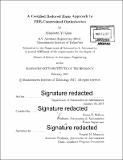| dc.contributor.advisor | Karen E. Willcox. | en_US |
| dc.contributor.author | Qian, Elizabeth Yi | en_US |
| dc.contributor.other | Massachusetts Institute of Technology. Department of Aeronautics and Astronautics. | en_US |
| dc.date.accessioned | 2017-05-11T19:56:25Z | |
| dc.date.available | 2017-05-11T19:56:25Z | |
| dc.date.copyright | 2017 | en_US |
| dc.date.issued | 2017 | en_US |
| dc.identifier.uri | http://hdl.handle.net/1721.1/108932 | |
| dc.description | Thesis: S.M. in Aerospace Engineering, Massachusetts Institute of Technology, Department of Aeronautics and Astronautics, 2017. | en_US |
| dc.description | Cataloged from PDF version of thesis. | en_US |
| dc.description | Includes bibliographical references (pages 65-67). | en_US |
| dc.description.abstract | Parameter optimization problems constrained by partial differential equations (PDEs) appear in many science and engineering applications. The PDE usually describes the underlying system or component behavior, while the parameters identify a particular configurations of the component, such as boundary and initial conditions, material properties, and geometry. Solving these optimization problems may require a prohibitively large number of computationally expensive PDE solves, particularly if the parameter dimension is high. It is therefore advantageous to replace expensive high-dimensional PDE solvers (e.g., finite element) with lower-dimension surrogate models. This work builds on the reduced basis (RB) method, a model reduction method that allows efficient and reliable reduced order approximations for a large class of parametrized PDEs. Traditionally, RB models are generated during a computationally expensive offline phase for a certain admissible parameter space. The optimization problem can then be solved efficiently during the online phase. However, since the RB model is only evaluated along the optimization trajectory, building an RB model for the entire admissible parameter set incurs superfluous offline costs. In this thesis, we break from the traditional RB offline/online decomposition and use a trust region framework to adaptiviely build the RB model along the optimization trajectory only. Novel a posteriori error bounds on the RB cost and cost gradient for quadratic cost functionals (e.g., least squares) are presented, and used to guarantee convergence to the optimum of the high-fidelity model. The proposed certified RB trust region approach uses high-fidelity solves to update the RB model only if the approximation is no longer sufficiently accurate, reducing the number of full-fidelity solves required. We consider problems governed by elliptic and parabolic PDEs and present numerical results for a thermal fin model problem in which we are able to reduce the number of full solves necessary for the optimization by up to 86%. | en_US |
| dc.description.statementofresponsibility | by Elizabeth Yi Qian. | en_US |
| dc.format.extent | 67 pages | en_US |
| dc.language.iso | eng | en_US |
| dc.publisher | Massachusetts Institute of Technology | en_US |
| dc.rights | MIT theses are protected by copyright. They may be viewed, downloaded, or printed from this source but further reproduction or distribution in any format is prohibited without written permission. | en_US |
| dc.rights.uri | http://dspace.mit.edu/handle/1721.1/7582 | en_US |
| dc.subject | Aeronautics and Astronautics. | en_US |
| dc.title | A certified reduced basis approach to PDE-constrained optimization | en_US |
| dc.type | Thesis | en_US |
| dc.description.degree | S.M. in Aerospace Engineering | en_US |
| dc.contributor.department | Massachusetts Institute of Technology. Department of Aeronautics and Astronautics | |
| dc.identifier.oclc | 986241962 | en_US |
